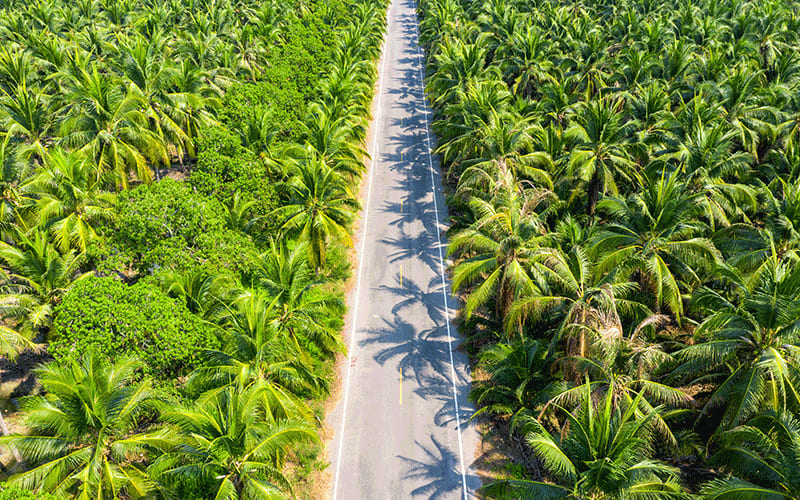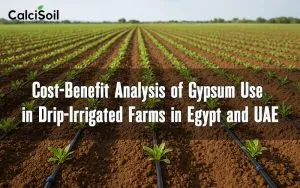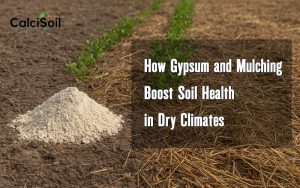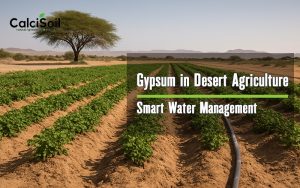
Agricultural gypsum for date palm
Agricultural gypsum can be used to improve the soil structure and nutrient content for date palm cultivation. Gypsum is a moderately soluble source of essential plant nutrients, calcium and sulfur. and it has been applied to agricultural soils for more than 250 years. It can help break up dense clay soils, such as Adobe clay, and improve their drainage.
Gypsum has been used in various agricultural applications, including as a calcium fertilizer for peanuts in the southeastern United States. However, there’s a lack of published guidelines that provide general best management practices related to land application uses of gypsum. including its use in date palm cultivation.
Benefits of using gypsum for date palm trees
Using gypsum for date palm trees can provide several benefits, including:
Improved soil structure. Gypsum can help break up dense clay soils, such as Adobe clay, and improve their drainage. This can lead to better root development and nutrient absorption by the date palm trees.
Enhanced nutrient availability. Gypsum is a moderately soluble source of essential plant nutrients, calcium and sulfur. By applying gypsum to soil, you can provide these nutrients to the date palm trees, promoting their growth and yield.
Reduced soil salinity. Gypsum can help reduce soil salinity in salt-laden earth. This can be beneficial for date palm cultivation, as high soil salinity can negatively impact their growth and yield.
Compatibility with organic farming. Gypsum is a naturally occurring mineral and can be used as a calcium fertilizer in organic farming systems. This can help support the sustainable and environmentally friendly management of date palm plantations.
Potential for waste recycling. Date palm waste can be recycled and processed for various engineering applications, such as biomass production and energy generation. By using gypsum in date palm cultivation, you can contribute to the sustainable management of date palm waste. and promote its reuse in other industries.
In addition to these benefits, gypsum has been used in other agricultural settings to improve soil properties and crop growth. For example, in gypsiferous soils, good yields of alfalfa and date have been obtained with gypsum levels up to 50%. However, it is essential to consider the tolerance, yield, and product qualities of various agricultural crops grown on gypsiferous soils.
How to apply gypsum to date palm trees
To apply gypsum to date palm trees, follow these steps.
Identify the appropriate time. Gypsum can be applied at different stages of the date palm’s growth. For example, in one source, it is recommended to apply 2 kg of gypsum per palm in April.
Prepare the gypsum solution. Gypsum can be mixed with water to create a slurry, which can then be applied to the soil. The exact ratio of gypsum to water may vary depending on the specific product and instructions.
Apply the gypsum solution. Use a suitable method to apply the gypsum solution to the soil around the date palm tree. This can include irrigation systems, such as drip irrigation, or manual application using a watering can or hose. Ensure that the gypsum solution is evenly distributed around the tree’s root system.
Monitor and adjust. After applying gypsum, monitor the tree’s growth and soil conditions to determine if additional applications are needed. Adjust your gypsum application schedule and rate based on the tree’s needs and soil conditions.
Risks of using gypsum for date palm trees
While gypsum can provide several benefits for date palm trees, there are also some risks associated with its use. These risks include:
Overuse of calcium. Gypsum is a source of calcium, and overuse can lead to an imbalance of calcium and magnesium in the soil. This can negatively impact the nutrient uptake of date palm trees and other crops.
Soil compaction. Applying gypsum to wet soil can lead to soil compaction, reducing the soil’s ability to absorb water and nutrients. This can negatively impact the growth and yield of date palm trees.
Water pollution. The use of gypsum in agriculture can lead to water pollution if not managed properly. Gypsum can contain toxic organic or inorganic compounds that can leach into groundwater or surface water.
Brittleness of gypsum-based composites. Gypsum-based composites reinforced with palm fibers can be brittle and have poor mechanical properties. This can limit their use in construction applications.
However it’s crucial to consult local agricultural experts or professionals for specific recommendations tailored to region and date cultivation practices. They can provide guidance on the appropriate time, method, and rate of gypsum application for your date palm trees.







